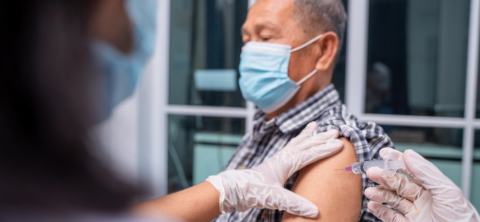December 4th, 2023

Respiratory Syncytial Virus (RSV) is a common respiratory virus that causes a mild, cold-like symptoms. Most people recover in a week or two, but RSV can be serious. Respiratory Syncytial Virus (RSV) can pose a significant threat to individuals 60-year-old and above, those with lung diseases, making it crucial for this vulnerable population to take proactive measures in prevention. Chronic respiratory conditions, such as chronic obstructive pulmonary disease (COPD) and asthma, can amplify the severity of RSV infections, underscoring the importance of targeted protective strategies.
Understanding the Risk for Individuals with Lung Disease
Older adults 60-year-old and above are at greater risk for more serious and severe complications from RSV because immune system weakens with age. People with underlying condition such as COPD and asthma could experience severe exacerbations of their conditions. Therefore, older adults 60 and above and those people with COPD and asthma and other underlying chronic lung condition should talk to their health care provider about RSV vaccine.
Protective Measures for Individuals with Lung Disease
Individuals with chronic respiratory conditions should diligently follow their prescribed action plans. Proper management of underlying lung diseases can help reduce the risk of complications if an RSV infection occurs.
Getting vaccinated against RSV other respiratory illnesses such as influenza and pneumonia is also important. Vaccination can mitigate the severity of illnesses, reducing the strain on the respiratory system.
You can take everyday preventive measures to limit the spread of RSV:
a. Stay home when sick.
b. Cover your cough and sneezes with a tissue or shirt sleeve, not your hands
c. Wash your hands often with soap and water for at least 20 seconds
d. Avoid touching your face with unwashed hands.
e. Avoid close contact with others, such as kissing, shaking hands, and sharing cups and utensils
f. Clean frequently touched surfaces such as doorknobs and mobile devices.
For individuals with lung disease, safeguarding respiratory health is paramount in the face of RSV and other respiratory viruses. By combining meticulous hygiene practices, vaccination against preventable respiratory infections, and proactive management of underlying lung conditions, individuals can enhance their resilience against the potential impact of RSV. Collaboration with healthcare providers and a commitment to preventive measures are essential components in promoting the well-being of those with lung disease in the ongoing effort to minimize the impact of respiratory infections.
To learn more, check out our webinar on Adult RSV from November 28, 2023, here:
